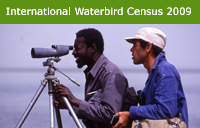International Waterbird Census _ millions of waterbirds counted
 Dakar-Fann,
Dakar-Fann,
Senegal, 15 January 2009 - Wetlands International Africa
has announced the start of the 42nd International Waterbird
Census (IWC) – a monitoring initiative to count millions
of waterbirds around the world.
The Census, which is coordinated by Wetlands
International, covers the collection and analyses of waterbirds
in Africa, Asia, Europe and South America. Each year, 15,000
volunteers count between 30-40 million waterbirds in over
100 countries using a standardised method, which makes it
easy to compare the gained census data. This year, the counting
is planned to take place on 17-18 January.
The IWC is a valuable source of information,
making it possible to monitor changes in waterbird numbers
and distribution, to improve knowledge of little-known waterbird
species and wetland sites, to identify and monitor sites
that qualify as Wetlands of International Importance under
the Ramsar Convention on Wetlands, to provide information
on the conservation status of waterbirds species and to
increase awareness of the importance of waterbirds and their
wetland habitats at local, national and international level.
The monitoring data collected during the
IWC is incorporated into the AEWA Conservation Status Report
on Migratory Waterbirds (CSR). One of the main results of
CSR in 2008 revealed that 41 % of the 522 migratory waterbird
populations on the routes across Africa and Eurasia are
declining and that conservation measures are urgently required.
At the end of last year the AEWA Secretariat
received a small grant from the Government of Germany for
the support of IWC in Africa, which was transferred to Wetlands
International.
The data collected through IWC are indispensable
for Multilateral Environmental Agreements such as the Ramsar
Convention on Wetlands and AEWA. Unfortunately no sustainable
funding has been secured for this important work, which
depends on the 15,000 volunteers that will be collecting
the data in the coming days. These dedicated bird enthusiasts
play an extremely important role and their effort is, as
always, highly appreciated.
For more information please visit:
-
Wetlands International - http://www.unep-aewa.org/news/news_elements/2007/international_waterbird_census_2007.htm
- http://www.unep-aewa.org/press/index_mop4_press_page.htm
- http://afrique.wetlands.org/
Dernière mise à jour le 16 Juin 2014


